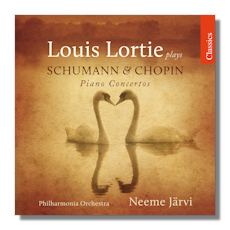
The Internet's Premier Classical Music Source
Related Links
-
Chopin Reviews
Schumann Reviews - Latest Reviews
- More Reviews
-
By Composer
-
Collections
DVD & Blu-ray
Books
Concert Reviews
Articles/Interviews
Software
Audio
Search Amazon
Recommended Links
Site News
 CD Review
CD Review
Louis Lortie Plays

- Robert Schumann: Piano Concerto in A minor, Op. 54
- Frédéric Chopin: Piano Concerto #2 in F minor, Op. 21
Louis Lortie, piano
Philharmonia Orchestra/Neeme Järvi
Chandos CHAN10603X
Also available previously released on CHAN9061:
Amazon
- UK
- Germany
- Canada
- France
- Japan
- ArkivMusic
- CD Universe
- JPC
The Schumann Piano Concerto is still immensely popular today, even though it long ago lost its status as a great virtuoso work. It hardly ever appears in a major competition any more, as candidates are more concerned about impressing the jury with a Prokofiev or Rachmaninov concerto: at the 2010 Queen Elizabeth Competition (concluded on May 29), six of the twelve finalists selected a Prokofiev concerto (3 played the 2nd, two the 3rd and one the 1st), two played a Rachmaninov concerto (the 2nd and 3rd) and two the Brahms 1st. There were also a Liszt 1st and Saint-Saëns 5th. Now, since I've digressed this far, I guess I should mention that Russian pianist Denis Kozhukhin, who played the Prokofiev 2nd in the final round, won first prize.
Having read all this, you ask what does difficulty have to do with artistic worth? Nothing, really. Not that the concertos I named are somehow less worthwhile – all are fine compositions. The Schumann provides a great listening experience, even if it is less flashy than many other concertos. And it's in good company: the Mozart piano concertos, for all their subtle challenges, aren't virtuoso works, either, but who would dismiss them? A Mozart concerto was a mandatory selection, by the way, in an early round at the Queen Elizabeth Competition!
Back to the issue at hand… Louis Lortie captures the full measure of the Schumann Piano Concerto, imparting a more Romantic approach than is usual: legato is liberally applied, especially in the finale, so that the music has less an edge, with textures more blended than separated. The performance on the whole has an epic sweep. Järvi seconds Lortie's approach, mixing the meaty with the muscular, and the spirited with the juicy. All in all, this is a fine Schumann Concerto performance, competitive with Argerich, Pollini and other stalwarts in this warhorse.
The Chopin 2nd, which as most know, is really the composer's 1st Concerto, also draws a fine performance from Lortie and Järvi. The concerto is less effective than the Chopin 1st: the finale has a patchwork quality about it and while the work is thematically attractive, its climactic moments are less effective than those in its sibling. But for those who are fans of this concerto, the Lortie/Järvi collaboration here presents the work in its best possible light, highlighting its lyricism, capturing its playful sense of youth and pointing up the plentiful moments of the composer's burgeoning genius. The sound in both concertos is excellent. Recommended.
Copyright © 2010, Robert Cummings





















